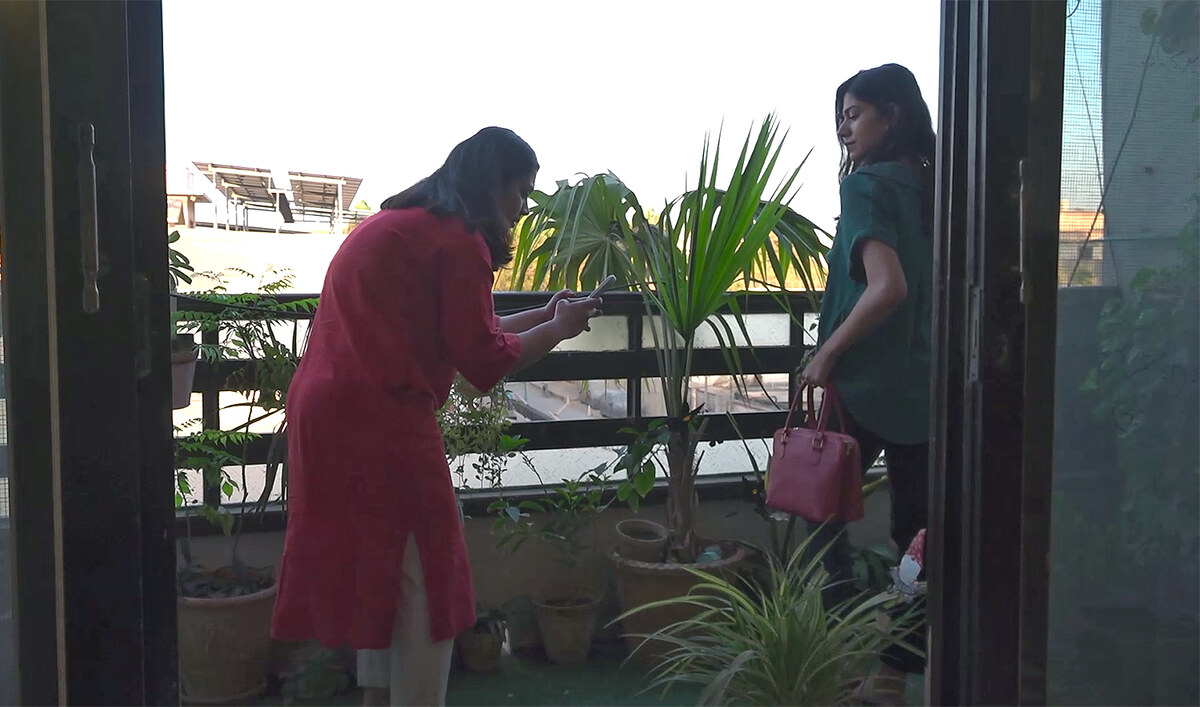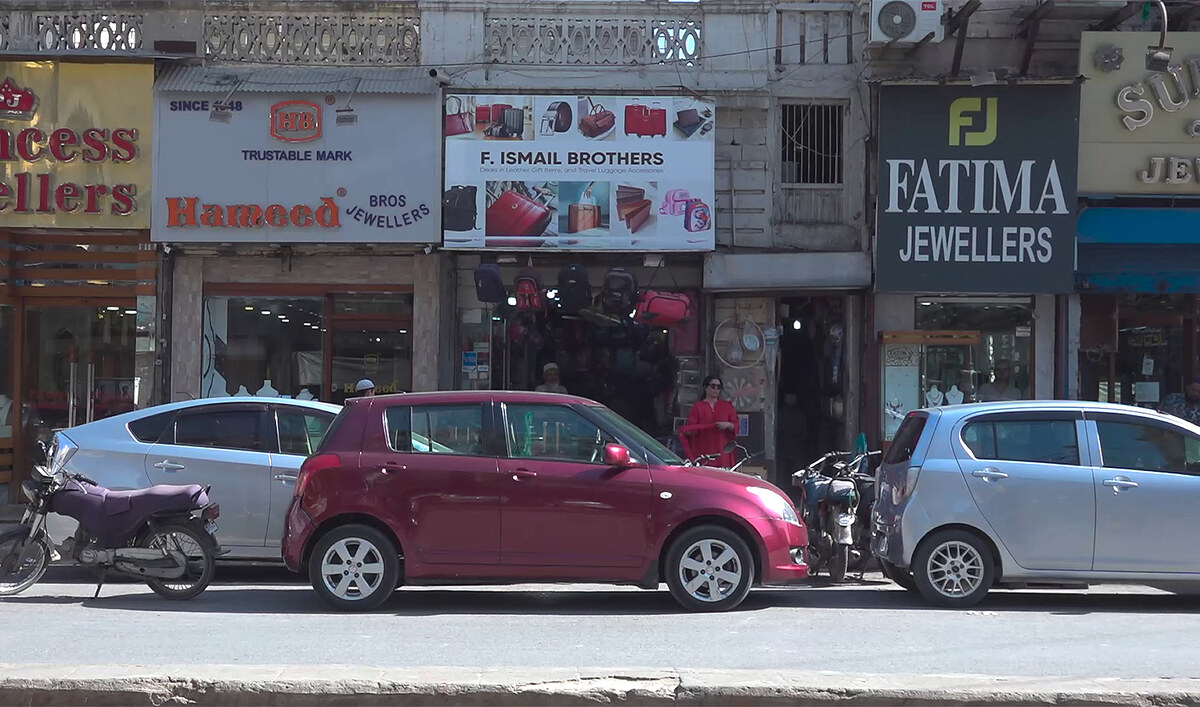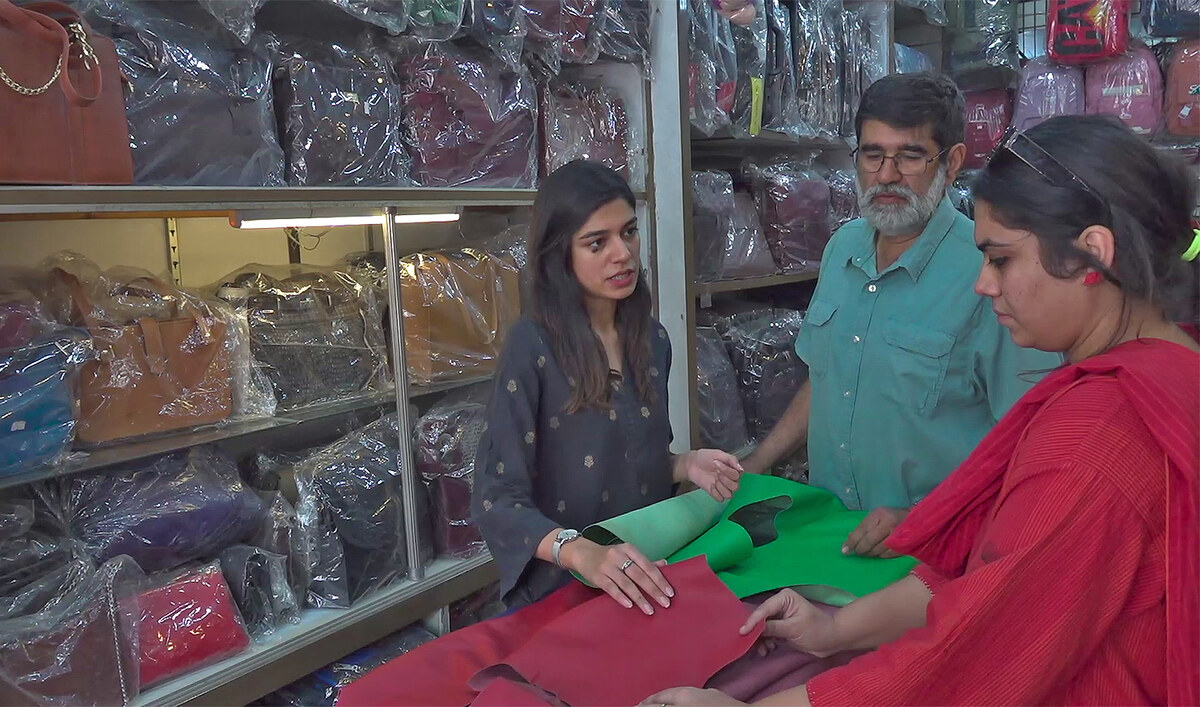ISLAMABAD: The son of Pakistan’s slain first woman leader Benazir Bhutto has struggled to assume his mother’s mantle but is waiting in the wings for his turn on stage — perhaps in a supporting role for now.
Bilawal Bhutto Zardari’s family were once center-stage in Pakistan’s politics, their fortunes rising and falling in a Shakespearean saga of tragedy and power.
Benazir’s death in a campaign trail assassination carried the Pakistan Peoples Party (PPP) to power under Bilawal’s father in a 2008 sympathy vote, but they have since wilted into a third-place concern.
Bhutto Zardari, the soft-spoken scion who inherited party leadership as a teen, was long-criticized for lack of experience and paling in comparison to his parents.
But the floppy-haired 35-year-old enters Thursday’s election with his first experience of statesmanship, having served as foreign minister in a broad coalition that ousted Imran Khan in 2022.
“They know me now,” he told AFP at a rally last week.
The millennial candidate professes a Netflix addiction and is less than half the age of his rivals Khan and Nawaz Sharif, who is seen as the kingmaking military’s favored candidate.
Despite the Bhutto pedigree, Bilawal and PPP are on track to play only a minor role in the coming government, but maneuvring for a larger part down the line.
“I could see them as junior coalition partners,” political analyst Hafsa Khawaja told AFP. “I don’t see him as a potential candidate for the position of prime minister.”
Bilawal’s grandfather Zulfikar Ali Bhutto forged the PPP in southern Sindh province 50 years ago, with a “bread, clothing, shelter” slogan that propelled it into a populist force.
He ascended to the highest civil office but was deposed by General Zia-al-Haq in a coup and hanged in 1979 despite international outcry.
Benazir, as her son would be decades later, was thrust into the spotlight. Following Zia’s death in 1988, she was elected prime minister at the same age Bilawal is today.
“My mother often said that she didn’t choose this life, it chose her,” Bhutto Zardari told AFP at his family home in Karachi in 2017. “The same applies to me.”
However, her government was undercut by military interference and allegations of corruption and despite becoming prime minister twice, she never completed a term.
Ousted in 1996, she spent most of the years of Pervez Musharraf’s military dictatorship in self-exile, returning in 2007 to contest another election.
But hopes sparked by her return were shattered by her assassination weeks later. Her murder was pinned on jihadists, with a UN investigation accusing Musharraf of failing to provide sufficient security.
Less than two weeks before polling day on February 8, Bhutto Zardari rallied the PPP at the spot where she was killed in the city of Rawalpindi.
Bilawal was named PPP chairman after his mother’s death but, still just a student, he returned to Oxford University.
His father Asif Ali Zardari — nicknamed “Mr 10 Percent” over the many graft claims against him — took control as the party swept the 2008 elections.
But he presided over its decay, fueled by allegations of corruption and incompetence. Analyst Khawaja said the PPP is now trying to rekindle the “Bhutto brand.”
“Even if he doesn’t get to be at the position of the prime minister right now, he is still a young man,” she said.
Bilawal Bhutto-Zardari: scion of doomed dynasty fights for limelight
https://arab.news/ycwpa
Bilawal Bhutto-Zardari: scion of doomed dynasty fights for limelight

- Bhutto-Zardari’s family were once center-stage in Pakistan’s politics, their fortunes rising and falling in a Shakespearean saga of tragedy and power
- His mother Benazir’s assassination on the campaign trail carried Pakistan Peoples Party to power under Bhutto-Zardari’s father in 2008 sympathy vote
Pakistan, Bangladesh resolve to strengthen ties and trade cooperation during OIC meeting

- Pakistan’s Foreign Minister Ishaq Dar meets Touhid Hossain, Bangladesh’s adviser on foreign affairs, in Jeddah
- Once bitter foes, ties between both countries improved after fall of Sheikh Hasina’s government last year
ISLAMABAD: The governments of Pakistan and Bangladesh this week expressed satisfaction at the upward trajectory of ties between the two nations, resolving to enhance bilateral cooperation in trade and other sectors during a meeting between their senior officials, state-run media reported.
After decades of strained ties between the two nations, Islamabad and Dhaka have warmed up to each other after the fall of former prime minister Sheikh Hasina’s government last year.
The meeting between Pakistan’s Deputy Prime Minister and Foreign Minister Ishaq Dar and Bangladesh’s Adviser for Foreign Affairs Md. Touhid Hossain took place in Jeddah during the sidelines of the Organization of Islamic Cooperation (OIC) Council of Foreign Ministers summit.
“The meeting took place in a cordial environment, reflecting the fraternal sentiments from both sides,” state broadcaster Radio Pakistan reported on Saturday.
“Both the dignitaries expressed satisfaction over the upward trajectory of bilateral relations,” it added. “They agreed to enhance bilateral cooperation in all areas of mutual interest.”
Dar highlighted the two countries’ historical, religious, and cultural linkages, expressing Pakistan’s desire to enhance bilateral cooperation in areas of trade and people-to-people contacts, Radio Pakistan said.
Established together as one independent nation in 1947, Bangladesh won liberation from then-West Pakistan in 1971. Relations between the two countries continued to deteriorate Hasina’s administration, which prosecuted several members of the Jamaat-e-Islami (JI) party for war crimes relating to the 1971 conflict.
However, relations between Pakistan and Bangladesh have improved since Hasina was ousted in a bloody student-led protest in August 2024. Islamabad’s ties with Dhaka have also improved as Bangladesh’s relations with India, where Hasina has sought refuge, have deteriorated.
Last month, Bangladesh confirmed it was resuming direct trade with Pakistan after 50 years. The country’s food ministry said it would receive 50,000 tons of rice from Pakistan in March.
China rolls over $2 billion loan to Pakistan, confirms official

- Debt rollover commitments from China, Saudi Arabia and UAE helped Pakistan secure IMF bailout last year
- Development takes place as IMF delegation holds first review of Pakistan’s $7 billion loan program in Islamabad
KARACHI: China has rolled over a $2 billion loan to Pakistan, the adviser to the finance minister of Pakistan confirmed on Saturday amid Islamabad attempts to strengthen its financial reserves.
The development takes place as an International Monetary Fund (IMF) delegation is in Islamabad to conduct its first review of the $7 billion loan agreement reached between the two sides last year. The IMF delegation will assess the government’s performance in meeting key conditions of the loan. A successful review would secure the release of an additional $1 billion for Pakistan.
Debt rollover commitments from Pakistan’s allies and regional partners China, Saudi Arabia and UAE were instrumental in helping Islamabad secure the bailout program last year to keep its fragile economy afloat.
“Yes, it is confirmed that China has made this rollover,” Khurram Schehzad, the adviser to the finance minister, told Arab News on the phone. He confirmed the amount of the rollover was $2 billion.
Pakistan needs to repay over $22 billion in external debt in fiscal year 2025, including nearly $13 billion in bilateral deposits, Fitch said.
Pakistan’s Finance Minister Muhammad Aurangzeb has repeatedly said the country aims to escape its prolonged macroeconomic crisis by boosting exports, undertaking long-term financial reforms and ensuring economic growth led by the private sector.
As per its deal with the IMF, Pakistan has agreed to undertake reforms in its energy sector, widen the tax net and privatize loss-making state-owned enterprises.
Pakistan was able to build some trust with the IMF by completing a short-term nine-month program last year. Previous loan programs in Pakistan ended prematurely or saw delays after the governments at the time faltered when it came to meeting key conditions.
Pakistan warns against heavy rains, snowfall from Mar. 12-16 in KP and Punjab

- Westerly wave to enter northern parts of country from Mar. 9, persist till Mar. 16, says disaster management agencies
- Disaster management authorities advise citizens against traveling unnecessarily, alets district administrations
PESHAWAR: The provincial disaster management authorities (PDMA) in Pakistan’s northwestern Khyber Pakhtunkhwa (KP) and eastern Punjab provinces have warned against heavy rains and snowfall from Mar. 9-16, alerting district administrations to act against any untoward situations.
The PDMA in both provinces said that a “shallow, westerly wave” will enter the northern parts of the country form Mar. 9 and is expected to gain strength from Mar. 12 and persist till Mar. 16.
The PDMA KP warned that during this period, intermittent rain with thunderstorms/snowfall on mountains is likely in Chitral, Dir, Swat, Kohistan, Shangla, Battagram, Mansehra, Abbottabad, Haripur, Malakand, Buner, Bajaur, Mohmand, Khyber, Orakzai, Kurram, Waziristan, Peshawar, Charsadda, Nowshera, Swabi, Bannu, Karak and Kohat districts.
“PDMA has issued a letter to all district administrations to deal with any untoward incident due to rain/snowfall in advance,” PDMA KP said in its notification on Saturday.
Meanwhile, rain with thunderstorms and snowfall is expected in Punjab’s Murree and Galiyat region Mar. 9-16, PDMA Punjab said in a notification on Sunday.
It said rain with thunderstorms is expected in Rawalpindi and Attock, Jhelum and Chakwal on Mar. 10 while rain with thunderstorms (moderate with few heavy falls) is expected in Rawalpindi, Attock, Jhelum, Chakwal, Hafizabad, Gujranwala, Mandi Bahauddin, Sargodha, Khushab, Gujrat, Sialkot, Narowal, Lahore, Sheikhupura, Sahiwal, Faisalabad, Jhang, T.T Singh and Mianwali from Mar. 12-16.
It warned residents against traveling to these areas in Punjab during this time period, calling on them to save essential items such as food and warm clothing.
Parts of Pakistan last month received rains after a months-long drought severely impacted crops like wheat, a staple food, as well as vital cash crops like potatoes in several regions, according to the Pakistani climate change ministry.
Torrential rains during the monsoon season of 2022 triggered flash floods across the country, with scientists attributing it to climate change impacts. The floods killed over 1,700 people and inflicted damages worth $33 billion on Pakistan, as per official estimates.
Pakistani sister duo rebrands grandfather’s 50-year-old leather bag business, makes it online success

- Marium and Sakina Hussain manage most domains of the leather goods business they have named after their grandfather
- Offering a range of products, the sister duo now plans to not only launch a physical outlet, but expand it beyond Pakistan
KARACHI: Turab Ali Ismail Ji Munniwala, a skilled craftsman, set up a small leather retail shop in Pakistan’s commercial capital of Karachi in 1975 and put his heart and soul into making leather bags of various shapes and sizes. His son, Aqeel Hussain, took over the business ten years later and focused it on corporate giveaways, but after the passing of Munniwala more than three decades later, it became difficult for Hussain to run the business alone.
In conservative Pakistan, people often expect a male heir like Hussain, now in his 60s, to carry forward the family’s business and legacy, but Hussain had no son and his daughters, Marium and Sakina, determined to honor their late grandfather’s 50-year legacy, took it upon themselves and amazed many by making Munniwala’s leather bag business an online success.
The sister duo, 32-year-old Marium and 25-year-old Sakina who both had full-time careers as a graphic designer and a corporate lawyer respectively, set out to take their grandfather’s business online in February 2022. Today, their venture, named ‘Turab’ after Munniwala, is breathing new life into a legacy that could have faded away without them.
“It wasn’t a planned thing initially, but it just sort of came into being that ‘okay, who’s going to help Abbu [our father]?’,” Sakina recalled how Turab came to life.
“When we basically started to grow up, it was always a thing that who is going to take this business forward because we don’t have a brother. Living in a desi [local] household, it’s always a thing that businesses are being led forward by sons in a family.”

Born and raised in Karachi, the sisters belong to the Dawoodi Bohra community. The family’s shop in Saddar still exists, with their grandfather’s working table still intact. Two of the workers, who started out with their father years ago, still work at the shop and mainly look after the production side of affairs with Hussain.
“People nowadays kill to buy pure leather products, but we don’t have the kind of market for pure leather products here. The players that we have in the market are really expensive for the masses to buy,” Sakina told Arab News.
“And that’s kind of where the idea of Turab came into being. We wanted to create something that’s not only good quality leather but also really affordable.”
Both Marium and Sakina have since been pushing their family legacy forward with a fresh, modern touch.
“As far as the designing is concerned, that’s where we come in. We decided to make the most modern and minimal products that you don’t find in the market,” Marium told Arab News.

Turab offers a range of leather products including tote bags, cross body bags, duffel bags, wallets, travel organizers and laptop sleeves in shades of red, green, orange, yellow and blue.
“Being two women, who like to carry good bags [and] funky colors, the inspiration comes from within. All the players in the market that we have for pure leather, they typically go around the shades of browns [and] blacks,” Sakina said.
“And while that’s a big classic, the youth of today really resonates with vibrant and funky colors and that’s something that we’ve tried to incorporate in our brand.”
As co-founders, the two sisters manage most domains of the online business themselves. The branding is taken care of by Marium.
She also does product photography herself, with Sakina modelling for it.
“It’s a home-based setup [and] that’s how it started. We started making all of our products at the shop and then we brought it home. We converted our dada’s [grandfather’s] room basically into the Turab room and that’s where we store all of our products,” Marium said.

The sisters have been to pop-ups and exhibitions, which they say has really helped elevate their business.
But it has its challenges too.
“When people see two women behind the table, specifically men, they come and try to question the knowledge that we have about leather [and] about the product we are selling,” Sakina shared.
“They probably think that we don’t know enough or not more than them.”

Marium, on the other hand, was initially not taken seriously by the artisans at her grandfather’s shop.
“I often go to [our shop in] Saddar to discuss the production side and the karigars [artisans] often don’t take me very seriously. They give me that look that, ‘we will talk to your dad. He knows, you don’t know’,” she said, adding that she hasn’t see any women anywhere near the leather goods production side at least.
However, her father vouched for the skill of both sisters to run the business.
“They catch everything very quickly,” he said. “The leather business is a bit technical. It took them about a year and a half [to learn], but now they can feel everything and tell you what is leather and what is not.”
The two sisters have carved a niche and the future looks promising as they plan to launch a physical outlet and make Turab a “household name” not just in Pakistan, but beyond.
“From packing orders every two days to one week, now packing every single day [and] multiple orders in a day, we have come a long way. And just going forward,” Marium said.
“We got a couple of orders from Dubai. Right now, I am talking to someone in Canada [and] the USA.”
Pakistan and Egypt agree to strengthen ties in politics, defense and trade at OIC meeting

- Pakistan’s deputy PM and Egyptian foreign minister discuss greater people-to-people interactions
- Ishaq Dar also holds meetings with the OIC secretary general and Palestinian foreign minister in Jeddah
ISLAMABAD: Pakistan and Egypt agreed on Saturday to enhance their political, defense, cultural and economic relations, as Deputy Prime Minister Ishaq Dar met with Egypt’s Foreign Minister Badr Abdelatty on the sidelines of a special Organization of Islamic Cooperation (OIC) conference on Palestine, according to Pakistan’s foreign office.
In recent years, the two nations have strengthened bilateral ties through various initiatives, including the annual bilateral consultations focusing on cooperation in trade, investment and cultural exchanges.
In November 2022, Prime Minister Shehbaz Sharif attended the COP27 climate summit in Sharm El-Sheikh, Egypt, seeking climate compensation and debt relief following Pakistan’s devastating 2022 floods.
In their meeting, Dar and Abdelatty expressed satisfaction with the trajectory of both countries’ relations.
“They praised the enduring and multifaceted relationship between the two nations, which is founded on shared beliefs, values, and cultural connections,” the foreign office said. “They agreed to further strengthen their political, defense, cultural and economic ties, as well as enhance people-to-people interactions.”
Both officials also shared perspectives on regional and global issues of common concern, voicing deep alarm regarding ongoing Israeli violence in the West Bank and the situation in Gaza.
Dar acknowledged Egypt’s crucial role in providing humanitarian aid to Palestinians and its efforts to mediate a temporary ceasefire.
The two officials reaffirmed their opposition to the forced displacement of Palestinians, agreeing that a lasting resolution lies in the creation of a viable Palestinian state based on pre-June 1967 borders, with Al-Quds Al-Sharif as its capital.
Dar also invited Abdelatty to visit Pakistan at mutually convenient dates.
He also also conferred with OIC Secretary General Hissein Brahim Taha, discussing challenges facing the Muslim world and commending the OIC’s role in unifying the Ummah.
The deputy prime minister also met with Palestinian Foreign Minister Riyad Al-Maliki, reaffirming Pakistan’s unwavering support for the Palestinian cause and advocating for a viable Palestinian state.












